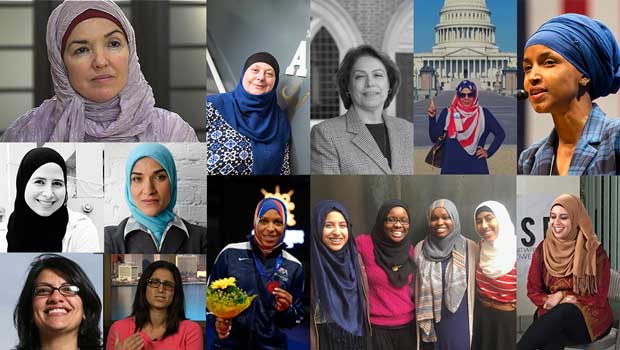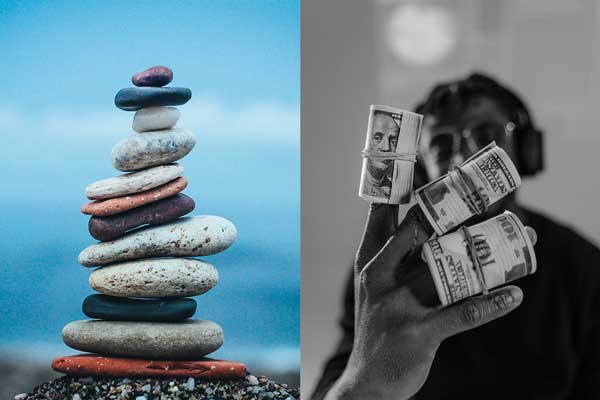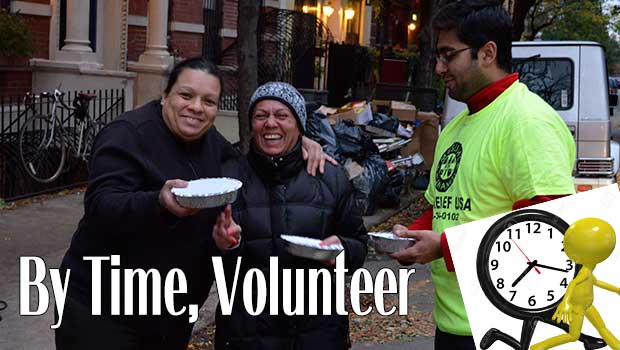Ilhan Omar
Ilhan Omar, the 35-year-old Somali-American who has become one of two Muslim women elected to Congress in 2018, spent four years in a Kenyan refugee camp and then immigrated with her family to the U.S. at age twelve. She ran on a progressive platform which she calls “a politics of moral clarity and courage.” She will work toward cancelling student debt, tweeting in October, “Instead of providing a tax cut to the top 1%, we need to cancel the $1.4 trillion dollars in student debt weighing us down.” She also wants to reduce funding for “perpetual war and military aggression” and supports criminal justice reform. She has been recognized for her hard work with the “Commitment to Service Award,” the “Champion of Change Award” given by Minnesota Urban Debate League, “The Jeanne and Joseph Sullivan Award” given for commitment to advancing human rights and women’s leadership, “Hall of Fame Award” given by the National Association of Women’s Business Owners for women who advance business leadership of women, and the 2018 “Citizen of the Year” Award given by the Minneapolis Rotary Club, and more.
Beyond stereotypes: contemporary Muslim women leaders, reformers, activists, and scholars
Ibtihaj Muhammad
Ibtihaj Muhammad began fencing as a 13-year-old and in 2016 became the first woman to compete in the Olympics wearing hijab. She received the bronze medal for Women’s Individual Sabre in the summer Olympics in Rio de Janeiro. “It’s a tough political environment we’re in right now. Muslims are under the microscope,” Muhammad said. “It’s all really a big dream — I don’t think it’s hit me yet. The honor of representing Muslim and black women is one I don’t take lightly.” She was a 3-time NCAA All-American and the 2005 Junior Olympic Champion. Ibtihaj graduated from Duke University in 2007 with a double major in international relations and African American studies. She serves on the U.S. Department of State’s Empowering Women and Girls Through Sport Initiative and gives of her time teaching fencing to inner city youth, a mentoring foundation started by Olympian Peter Westbrook.
Beyond stereotypes: contemporary Muslim women leaders, reformers, activists, and scholars
Rana Abdelhamid
Rana Abdelhamid founded the Women’s Initiative for Self-Empowerment (WISE), a self-defense, leadership and entrepreneurship program for young Muslim women in New York City. She also created the photography series, “Hijabis of New York,” a social media project aimed at presenting Muslim women, through photographs and interviews, in their everyday lives. Abdelhamid has worked with Amnesty International USA for eight years on campaigns supporting women’s rights, and to advocate for the end of the use of torture. She is currently the youngest serving board member of Amnesty International USA. She earned her bachelor’s from Middlebury College in International Politics and Economics and a master’s degree in public policy from the John F. Kennedy School of Government at Harvard University. She has conducted extensive research on civic participation and mobilization of minority communities. Abdelhamid is a recipient of the United Nations Association of the USA Leo Nevas Human Rights Youth Award and received the Harry S. Truman Scholarship for public service leadership.
Muslim Girls Making Change
Kiran Waqar, Balkisa Abdikadir, Hawa Adam, and Lena Ginawi are high-school students in the small city of Burlington, Vermont. But once they created their slam poetry quartet, Muslim Girls Making Change, their voices could not be ignored. They perform their passionate poetry on issues of social justice and aim to break down stereotypes about Muslims and other minority communities. They have performed both in the U.S. and on the international stage. In June 2018, they won a National Education Association Human and Civil Rights Award — the SuAnne Big Crow Memorial Award, recognizing their social justice outreach. “Whenever you hear the word terrorism, I don’t want the first thing you think about is Islam, because Islam, to me, is a religion of peace,” Ginawi told the Associated Press.
Zaineb Abdulla
After Donald Trump became president, Muslims and others in minority communities felt increased fear. Hate-filled rhetoric filled the air waves. Iraqi-American Zaineb Abdulla, based in Chicago, took action. Trained in Brazilian Jui Jitsu, she launched a seminar for Muslim women who long have been targets for bigots. Her Hate Crime Survival Seminars “are designed to give women the tools they need to stand up and fight back,” says Abdulla. She added, “By working to increase self-esteem and self confidence in addition to basic self-defense knowledge, we are strengthening women in body, mind and spirit.” Abdulla, who is deaf, also co-founded Deaf Planet Soul, a non-profit organization in Chicago that serves and empowers the deaf and hard of hearing. She is currently pursuing her masters in deaf education and nonprofit management.
Dr. Ingrid Mattson
Dr. Ingrid Mattson is on outspoken academic and religious leader. Soon after 9/11, she wrote in an article, “So often, it seems, we have to apologize for reprehensible actions committed by Muslims in the name of Islam. We tell other Americans, ‘People who do these things (oppression of women, persecution of religious minorities, terrorism) have distorted the true Islam.’ And so often we have to tell other Muslims throughout the world that America is not as bad as it appears. We say, ‘These policies (support for oppressive governments, enforcement of sanctions responsible for the deaths almost 1 million Iraqi children, vetoing any criticism of Israel at the United Nations) contradict the true values of America.’ But frankly, American Muslims have generally been more critical of injustices committed by the American government than of injustices committed by Muslims. This has to change.”
Mattson is currently the London and Windsor Community Chair in Islamic Studies at Huron University College at the University of Western Ontario, London, Canada. Since 2012, she has been a professor at Huron University College, teaching courses in classical Islamic thought; Islamic thought, culture and practices; Islamic ethics; and interpreting the Quran. She has her bachelor’s degree from the University of Waterloo in philosophy and fine arts and a doctorate in Near Eastern Languages and Civilizations from the University of Chicago. Dr. Mattson has received numerous awards and is the recipient of honorary doctorates from Trinity College, Hartford, and the Chicago Theological Seminary.
Dr. Azizah al-Hibri
Dr. Azizah al-Hibri was a Professor Emerita at the University of Richmond School of Law until her retirement in 2012. Her academic focus was the development of Islamic jurisprudence and law that are “gender equitable and promote human rights and democratic governance.” Dr. al-Hibri served as a commissioner on the U.S. Commission on International Religious Freedom, appointed by President Obama. She received the Virginia First Freedom Award from the Council for America’s First Freedom in 2007, the Dr. Betty Shabazz Recognition Award from Women in Islam in 2006, and the University of Richmond’s Distinguished Educator Award in 2004. She was named a Fulbright scholar in 2001. Dr. al-Hibri is also the founder and chairwoman of KARAMAH: Muslim Women Lawyers for Human Rights, a nonprofit organization “committed to promoting human rights globally, especially gender equity, religious freedom and civil rights in the United States.” Dr. al-Hibri earned a B.A from the American University of Beirut and a Ph.D. in philosophy as well as her J.D. from the University of Pennsylvania.
Dalia Mogahed
As former executive director of the Gallup Center for Muslim Studies, Dalia Mogahed combined her interest in collection and analysis of data and religion, particularly Islam. The organization is a non-partisan research center that surveys and analyzes the views and opinions of Muslims around the world. She has a B.S. in chemical engineering from the University of Wisconsin and an MBA from the Joseph M. Katz Graduate School of Business at the University of Pittsburgh. Mogahed was born in Cairo, Egypt and immigrated with her family to the U.S. when she was four-years-old. She is currently the Director of Research at the Institute for Social Policy and Understanding (ISPU) which “conducts objective, solution-seeking research that empowers American Muslims to develop their community and fully contribute to democracy and pluralism in the United States.” Her TED Talk on “What it’s like to be a Muslim in America” has been viewed 2.8 million times. In an interview, Mogahed said, “We can challenge Islamophobia like how we challenge any other form of bigotry or racism; we first have to learn what it is, and we have to educate ourselves on its fundamental manifestation…There are many subtle and insidious ways that racism and bigotry manifest, so when we educate ourselves on what those are, and how we can ourselves conform to them and have these implicit biases, we develop an awareness and ability to conquer those things.”
Rashida Tlaib
Palestinian-American Rashida Tlaib, along with Ilhan Omar, will take office on January 3. They are two Muslim women elected to Congress in November of last year. Tlaib, 42 years old, is a lawyer who was elected to represent Michigan’s 13th congressional district in the U.S. House of Representatives. She served in the Michigan House of Representatives from 2009 to 2012. Some of Tlaib’s priorities in Congress will be raising the minimum wage to $15, preventing cuts to Social Security, Medicare, and Medicaid, equal pay for equal work for women, overturning Citizens United, and restoring the Voting Rights Act. Tlaib is a progressive Democrat, along with others in the progressive wing including Elizabeth Warren, Bernie Sanders, and Kamala Harris. After serving in the Michigan legislature, Tlaib worked for the non-profit Sugar Law Center for Economic and Social Justice as an attorney and advocate. In that role, she worked on various campaigns including efforts to stop the dumping of toxic chemicals into the Detroit River, to stop tax breaks for the wealthy, and to combat bigotry.






